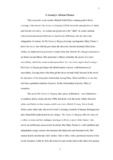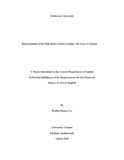Please use this identifier to cite or link to this item:
https://elibrary.tucl.edu.np/handle/123456789/684| Title: | Representation of the Male Body in Doris Lessing’s The Grass Is Singing |
| Authors: | Lo, Prabin Kumar |
| Keywords: | Heterosexual Sex;Masculinity;Femininity;heterosexual masculinity |
| Issue Date: | Aug-2010 |
| Publisher: | Central Department of English |
| Institute Name: | Central Department of English |
| Level: | Masters |
| Abstract: | This research on Doris Lessing’s The Grass is Singing (1950) examines how masculinity renders females powerless. In the novel, Lessing’s protagonist, Mary Turner’s desire for sex is met with disgust when she discovers that her husband, Dick lacks virility, by implication he possesses weaker body than herself. So, she gets attracted to her black servant Moses. Her attraction to Moses embodies the power of a virile masculinity, which has made women powerless. So, this thesis argues that Lessing’s The Grass is Singing privileges the identification of power with heterosexual masculinity, which is manifested through the male body because the dynamics of the triangular relationship involving Mary, Dick and Moses is one that prioritizes gendered relations of power – a relationship in which Mary is rendered powerless. |
| URI: | http://elibrary.tucl.edu.np/handle/123456789/684 |
| Appears in Collections: | English |
Files in This Item:
| File | Description | Size | Format | |
|---|---|---|---|---|
| chapter.pdf | 148.5 kB | Adobe PDF |  View/Open | |
| cover.pdf | 15.18 kB | Adobe PDF |  View/Open |
Items in DSpace are protected by copyright, with all rights reserved, unless otherwise indicated.
